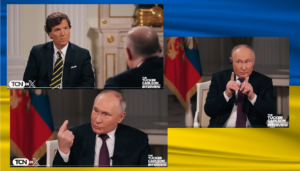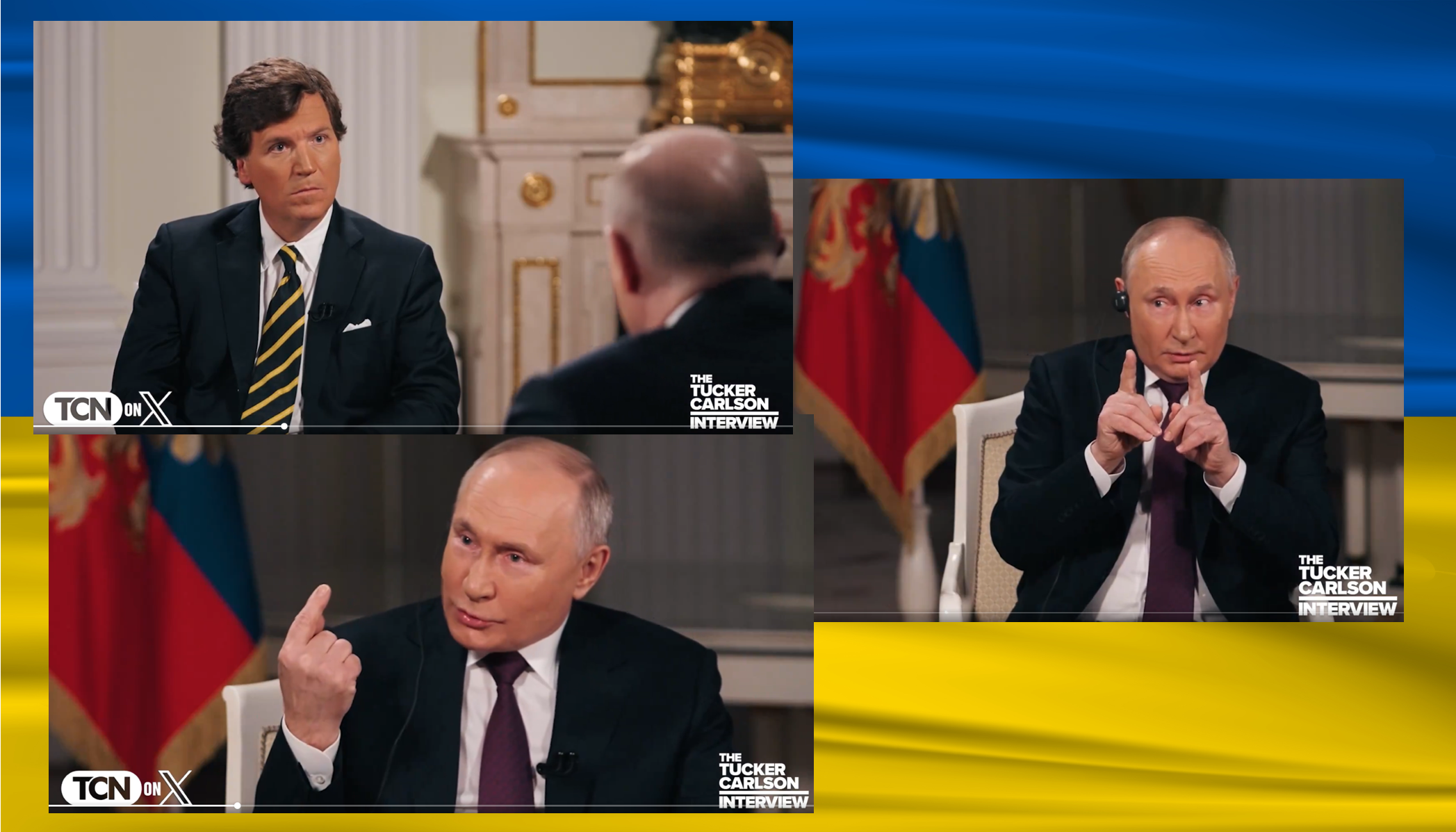
Vladimir Vladimirovich Putin came prepared for the interview with Tucker Carlson. He skillfully put Tucker in his place by reminding him he was not good enough to be accepted by the CIA.
Not prepared, Tucker was surprised by Putin’s lecturing him at length about the region’s history. Like most Americans, Tucker is not good at history. If he devoted at least a few hours to learning, he would discover history is vital for non-Americans.
At the time of launching an invasion of Ukraine, Putin made a few prolonged speeches full of historical references. He repeated his earlier article “On the Historical Unity of Russians and Ukrainians,” which is available in English on the official Kremlin website. Tucker appeared as if he had not heard about that.
Unschooled, Tucker was not an equal partner for the history chat with Putin. He could not react when Putin eloquently misinterpreted the historical facts or lied. For example, Putin said that the name of Ukraine comes from the old Slavic term “u kraja,” meaning the land of the edge. It has some historical resonance because Ukraine was on the edge of Lithuania, the Polish-Lithuanian Commonwealth, and later Russia for a big part of its history. But Ukrainians adamantly oppose that explanation and claim historical records used that name much earlier, at the time of Kievan Rus, when it was the center of the Slavic world. As a result, the name might come from the ancient Slavic word “kraina,” which means a region or province.
Putin devoted a lot of attention to the Pereiaslav Agreement in 1654 when Cossack leaders switched their allegiance from Poland to Russia. Putin pointed out correctly that Ukrainians did not get far-reaching autonomy from Poland and turned to Russia for protection. But he forgot to add that as soon as they signed the agreement, the tsar’s emissary told them that as the tsar’s subjects, they needed to follow his orders, not tell him what they wanted.
At that time, Poles screwed up badly the historic opportunity to build up a powerful multinational country by recognizing the separate national identity of Ukrainians. Ukrainian historians agree that breaking out from the Polish-Lithuanian Commonwealth in 1654 was a mistake that delayed Ukrainian independence for centuries. But those issues are far beyond Tucker’s knowledge of the subject.
Interestingly, the brightest moment in the interview was when Tucker asked if Putin wanted to redraw the borders as they were in 1654. Putin got confused but soon realized Tucker did not notice how good that question was.
Putin claimed that the Austrian secret service agents revived the Ukrainian national awareness in preparation for World War I. Tucker swallowed that without hesitation.
With the industrialization in the 19th century came universal education. Then, people started wondering why they needed to use a different language at schools, offices, churches, and places of work than they spoke at home. Why were there no newspapers in their native languages? The resurgence of the almost-gone Czech language is a classic example. The revival of the Ukrainian national identity was among many that happened in Europe then. But Tucker’s body language indicated he was impressed by Putin’s wisdom.
As a Pole, I could not help but notice Putin’s claim that Poland cooperated with Hitler in 1939 but not enough, forcing him to start the war. For Americans knowing history as much as Tucker does, Hitler asked for a critical part of Poland’s territory, implying that the remaining part would be a vassal of Germany. Poles were not impressed.
Like many American politicians and pundits, Tucker focuses on the politics of the day in abstraction from history, culture, and human aspirations. So, unsuccessfully, he tried to elicit from Putin if he would accept the status quo to stop the war. Tucker never asked Putin the most important question: What are his objectives in Ukraine?
If Tucker had done his homework, he would have known that Putin does not see the future of Ukraine as an independent nation. He wants it to be a part of Russia. Then, logically, there would be questions about the optimal way to reach that goal. Is the war the best way? Is bombarding civilian objects the most persuasive?
Tucker came to the meeting with Putin convinced that Ukraine is a client state of the United States and exists only because Americans are paying for it. Fortunately for listeners of the interview, Putin proved Tucker wrong on that. By the end of the meeting, Putin mentioned a situation on the front where the prevailing Russian force surrounded a group of Ukrainian soldiers. Their only chance of surviving was to surrender. They rejected that option and, as a result, perished because, as they said in Russian, “Russians never surrender.” It implies that those soldiers were Ukrainian citizens of Russian ethnicity fighting Russian invaders. Tucker did not ask Putin about his thoughts on what is special about Ukraine that those Russians living there considered it worth sacrificing their lives for.
That example brings us to history. Putin brushed over it, but ignoramus Tucker did not pick up on it. It is the 240 years of Mongol domination known in Russian history as the Tatar Yoke. I wrote about it in my article “Why do most Westerners misunderstand Russia?” Tucker is one of those Westerners.
The 240 years of brutal Mongol rule embedded in Russians’ minds that the rulers should have absolute power to extort from their subjects whatever they might desire. If Tucker had prepared for the interview, he would have asked for the meaning of “the sphere of influence.” In the Western world, it is the freedom of trade, where both sides can benefit. It is a great concept despite often not working perfectly. The sphere of influence for Russians is the ability to coerce others to conduct business on terms good for Russia. Sadly, Tucker seems to have no idea about it.
If he did, he would recognize that despite all its imperfections, Ukraine strives to build on its traditions of individual freedoms and reconnect with the Western world. Then, he would know that those ethnic Russians were not dying for Ukraine; they gave their lives for “these truths to be self-evident, that all men are created equal, that they are endowed by their Creator with certain unalienable Rights.”
For Tucker, those words are handy phrases in his tirades. For Ukrainians, they are ideas worth fighting for, to the end, regardless of whether they speak Ukrainian or Russian at home.
Tucker’s regard for Russian concerns drastically contrasted with his absolute disinterest in the aspirations of Ukrainians. Their fate is not relevant to people with Tucker’s mindset.
Similarly, Russia’s geopolitical worries with the expansion of NATO are valid, but mirroring them, the fears of Poland and the Baltic states about the reemergence of Russian imperialism are not of any importance to people in Tucker’s world. The licking of Putin’s behind could not be any more distasteful.
The list can go on.
Why were there no questions about international law?
How can one talk about Russia taking back control of Ukraine without mentioning the Holodomor? Russia has some credibility issues, kindly speaking.
With Tucker supporting Russia’s conquering of Ukraine, should Poland and the Baltic states be concerned that NATO’s Article 5 might one day be as good for them as the Budapest Memorandum is for Ukraine now?
Last, if the West gives Russia the OK to take over Ukraine, what will the day after look like? How many Ukrainians will Russia need to kill to make sure that all those remaining are loyal?
Tucker is far above those prosaic questions.
One American dunce outfoxed by Putin is not a problem. But Tucker has 12.1 million followers on X. Within the first day, just on X, about one million gave positive feedback between retweets and likes. About 150 million people worldwide watched the interview. Very few of them are informed enough to catch the lies and tricks of the seasoned KGB operative. Just by reading comments on X, I see how many Americans got fooled by Putin as much as Tucker did.
In America, their vote is as good as those who know better.

 Many tell us what to think. I ask my readers to be skeptical. Question me and others.
Many tell us what to think. I ask my readers to be skeptical. Question me and others. 
